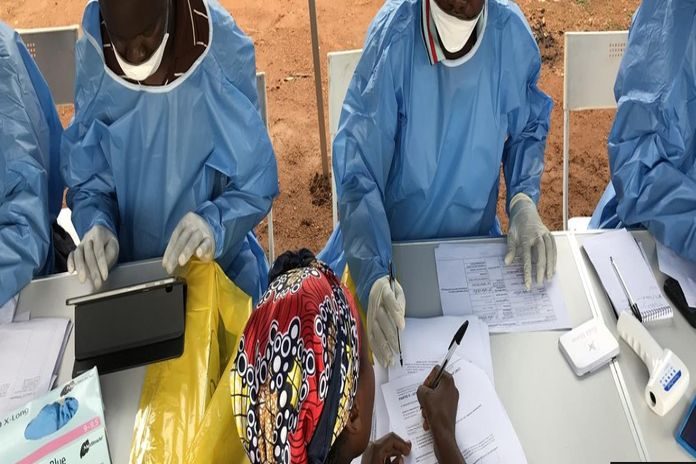GENEVA, Switzerland – The World Bank and the World Health Organization (WHO), along with the government and other key partners, are working in close partnership on the Ebola crisis response in the Democratic Republic of the Congo (DRC). Central to this partnership is the assessment of the financing needs, and deployment of resources, with the goal to put an end to the current deadly outbreak.
The World Bank has announcing that US$50 million in funding is to be released to WHO for its lifesaving operational work on the frontlines of the outbreak. The WHO is announcing that this US$50 million in funds will close the financing gap for its emergency health response in DRC through to the end of September 2019 and is calling on other partners to mirror this generous support in order to fund the response through to December.
The funding comprises US$30 million from the Pandemic Emergency Financing Facility (PEF) and US$20 million from the World Bank. The US$50 million in grant funding is part of the larger financial package of approximately US$300 million that the World Bank announced last month to support the fourth strategic response plan for the DRC Ebola outbreak.
“WHO is very grateful for the World Bank’s support, which fills a critical gap in our immediate needs for Ebola response efforts in DRC, and will enable the heroic workers on the frontlines of this fight to continue their lifesaving work,” said Dr Tedros Adhanom Ghebreyesus, Director-General, World Health Organization. “We keenly await further funding from other partners to sustain the response through to the end of the year.”
The DRC government, working in collaboration with the World Bank, WHO, and other key partners, has finalized the Fourth Strategic Response Plan (SRP4), which outlines the total resources needed for the DRC Ebola crisis response from July to December 2019. The financing announced recently is part of the World Bank’s previously announced financial package of up to US$300 million and covers over half of SRP4’s needs, with the remainder requiring additional funding from other donors and partners.
“The World Bank is working closely with WHO, the government of DRC, and all partners to do everything we can to put an end to the latest Ebola outbreak,” said Annette Dixon, vice president, Human Development at the World Bank. “The partnership between our organizations and the government is critical for responding to the emergency as well as rebuilding systems for delivery of basic services and to restoring the trust of communities.”
The government of DRC requested US$30 million from the PEF cash window to be paid directly to WHO. The PEF steering body approved the request bringing the PEF’s total contribution to fighting Ebola in DRC to US$61.4 million. The PEF is a financing mechanism housed at the World Bank; its steering body is co-chaired by the World Bank and WHO, and comprises donor country members from Japan, Germany and Australia.
The quick and flexible financing it provides saves lives, by enabling governments and international responders to concentrate on fighting Ebola, not fundraising.
Meanwhile the Ebola outbreak in the Democratic Republic of the Congo reaches 3000 cases, WHO calls for the full force of all partners to respond and increase their presence in the field to stop Ebola and to address one of the largest and most complex humanitarian crises in the world.
“Our commitment to the people of the Democratic Republic of the Congo is that we will work alongside them to stop the Ebola outbreak,” said WHO Director-General Dr Ghebreyesus. “Our commitment also means strengthening health systems to give them all the other things they need. Building strong systems is what will protect people, communities and the world. “
With a population of 80 million, the Democratic Republic of the Congo has more than four million displaced and is home to the world’s second largest food crisis with 13 million people food insecure. Since January 2019, there have been outbreaks of cholera (15,331 cases, 287 deaths), measles (161,397 cases, 3,117 deaths) and malaria, the leading cause of death in the DRC, which kills more than 48,000 people every year.
“We are working in an incredibly complex environment, but thanks to support from donors and actions taken by the ministry of health, WHO and partners, we have saved thousands of lives,” said Dr Moeti. “We strive towards a much more united approach and call on NGOs and UN partners to continue to accelerate all activities. Everyone has a role to play and we each must be accountable for what we signed up to do, only then will we end this outbreak.”
The outbreak was declared on August 1, 2018. As of August 27, there have been 2,997 cases of Ebola, with 1,998 deaths and 893 survivors. Most of the cases are in North Kivu province. In the past 10 weeks, an average of 80 people per week are sickened by the virus.
More than 200,000 people have been vaccinated against Ebola in the Democratic Republic of the Congo, along with health and frontline workers in Uganda, South Sudan, Rwanda and Burundi. Two therapeutic treatments being used in the country as part of a clinical trial have shown to save 9 of 10 lives if used at the right time.
More than 89 million screenings within the country and at international borders have helped control the spread, by identifying and providing care to anyone with symptoms. On 29 August, Ugandan health officials announced confirmation of another case in the country: a child who had crossed over from the Democratic Republic of the Congo. As this alert underlines, regional preparedness will remain key.







